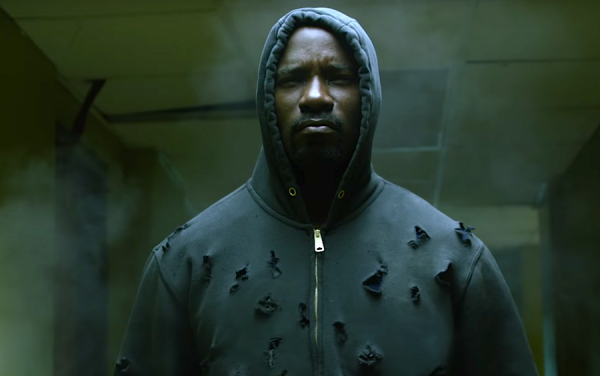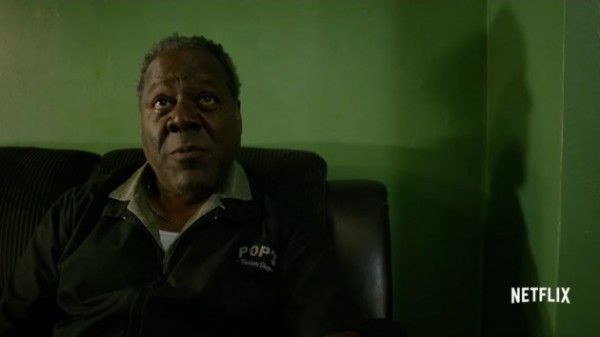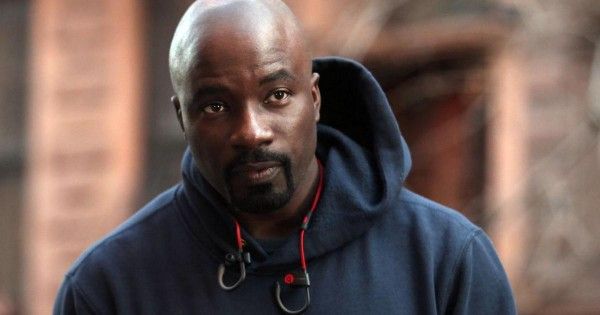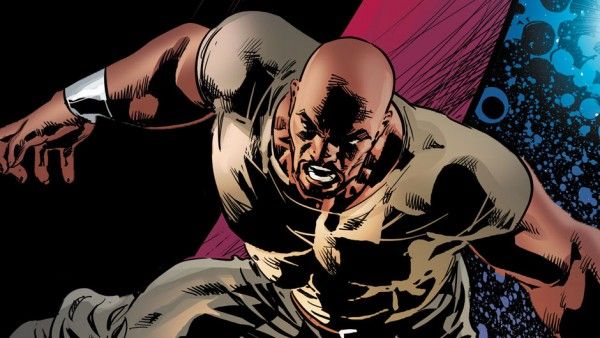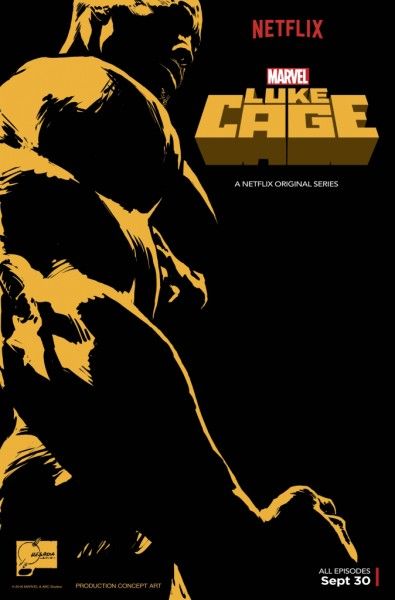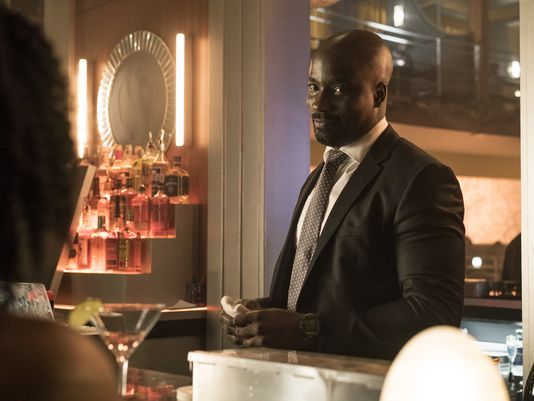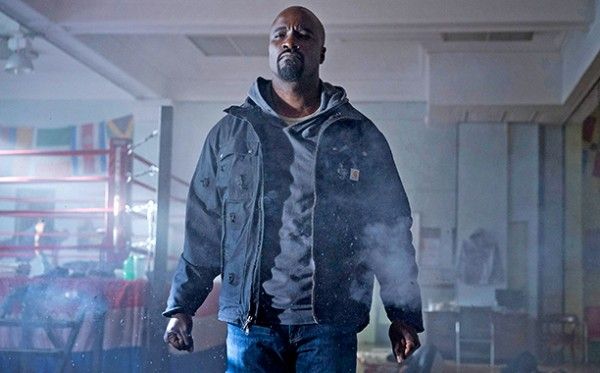On the Netflix series Marvel’s Luke Cage, a sabotaged experiment has left Luke Cage (Mike Colter) with super strength and unbreakable skin. Now a fugitive trying to rebuild his life in modern day Harlem, New York, he is pulled out of the shadows and must face his own past, in order to save the future of his city.
While at Comic-Con for a huge panel that included a glimpse of Iron Fist and the announcement of a 2017 release for The Defenders, actor Mike Colter, showrunner Cheo Hodari Coker and Head of Marvel TV Jeph Loeb spoke to press in a roundtable interview in which they discussed this take on Luke Cage, what it’s like to learn about this character from his point of view, instead of that of Jessica Jones (Krysten Ritter), paying homage to the character’s classic look, embracing race, the role of Shades (Theo Rossi), how everything that’s been done has been leading to The Defenders, and the unprecedented approach Netflix has taken in telling these stories.
Question: How do view Luke Cage? What’s your take on him?
MIKE COLTER: He’s a guy that has been thrust into a place that he doesn’t really want to be. He’s a guy who’s been endowed with abilities, as they say. To him, it’s not positive. At least he doesn’t see it that way. He’s reluctant, and he’s the kind of guy who shies away from the spotlight. He’s a humble guy. He doesn’t want any part of this. But ultimately, it’s something that he’s going to have to deal with. It’s perfect for me because I don’t really like the spotlight either. I think with him, it feels like a glove.
CHEO HODARI COKER: He’s a complicated man who no one understands, but his woman, and his woman, in this case, happens to be dead. So, he basically deals with that. He deals with the fact that he has very few people that he can talk to. He wants to lay in the cut. He never wanted a spouse. He didn’t ask for this. Now that he has it, he doesn’t necessarily want the spotlight and the heat that comes from being different. But then, when things are out of his control that could have been in his control had he prevented certain things from happening, and there are consequences for not doing what he should have done in the first place, he feels a responsibility to come out of the shadows and be a hero. So, part of what the first season is about is, how does one accept the mantel of being a hero? There’s that pivotal line in the first episode when he says, “I’m not for hire man, but I’ve got you.” For Season 1, we’re looking at what it means to be a hero, the sacrifices that come from that, and how one gets to the point when you finally accept who you are.
Mike, what’s it like to embody this character under a different showrunner than you originated him with?
COLTER: Yeah, it’s interesting. I look at it from the standpoint as like being directed by a different director, every episode. As an actor, there’s something that different people bring to the interpretation. The showrunner for Cage is a black man, and the Jessica Jones showrunner was a white female. Jessica Jones was told by the point of view of Jessica, so Luke Cage existed in her point of view and how she interacts with him. So, we’re doing this from the leadership of a black male, who is now the showrunner examining this character. It’s the same character, we’re just turning up the volume on certain colors and certain flavors. He’s in Harlem now. We all act differently in certain places. We don’t want to admit it, but we’re different where we grew up than we are with our family, and than we are with the guys that we went to college with or our fraternity brothers. People just exist differently. It’s small, subtle things, but different colors come out. That’s all there is to it.
COKER: Also, I thank Melissa [Rosenberg], every single day, for casting Mike. She cast the perfect Luke Cage. What’s great about Mike is not just that he literally looks like the character, as he was drawn, but at the same time, he also has the sensitivity. Yes, we’re going to have the grit of Luke Cage, but I also thought it was important that we have somebody that could embody the sensitivity of conversation and personality. Even though my approach is slightly different, the Luke Cage of Jessica Jones is no stranger to the Luke Cage of Marvel’s Luke Cage. It’s really a continuation, to a certain extent. It’s just got a little different flavor, but it’s still the same suit.
Cheo, is it a challenge to write the plot to coincide with what people know from the comic books?
COKER: Not really. Daredevil is haunted by Frank Miller, from the standpoint of the Frank Miller run on Daredevil is so insurmountable. The only thing you can really do is match it, which the show has. Brian Michael Bendis’ run on Alias, in terms of what he did with Jessica Jones, it’s that the level of maturity and the deep themes of that comic translate perfectly into the series. With Luke Cage, the tone was never that deep or very heavy. With every single issue, there was Cottonmouth or Big Ben, or all these different people. At first, I thought that was a disadvantage, but it turns out it was a great advantage for our show. There’s been 30 to 40 years, where people really had to explore some of these characters, so we can reinterpret them and do it in such a way that definitely respected the spirit of the original comics from the ‘70s and all the different iterations, but at the same time, as a show, existed in its own space. I think what happens is that because they’re different, people will go back to the comics and experience that richness.
Although you don’t have to be familiar with the comic to enjoy this series, there’s a great moment with a nod to the classic look that was so inspired. How fun was it to do that?
COKER: Charles Murray wrote that episode and actually executive produced the show with me, and actually now co-runs the show Star on Fox. Not only is Charles a brilliant writer/director, he’s also a geek, bar none. He was like, “Cheo, I’m writing that episode.” And I was like, “Yep, that episode is all yours.” He was the one that did it because, for the life of me, I could not figure out how you could incorporate the tiara in an organic way.
COLTER: I’m not a geek, in that sense, but I’ve been playing him for awhile now and I’ve been absorbing other people’s energy. I can only imagine what it must feel like to watch it happen slowly It’s like a slow orgasm, of some sort. A very slow orgasm that builds.
COKER: Tantric.
COLTER: Honestly, I felt like that was the longest episode of the series. I’m not kidding you. With the costume, the make-up, the set-ups, and the flashback sequence, it just took a long time to build that. I felt like once we got passed that episode, it was like, “Man, I think I could finish the series now.” That episode felt like a series by itself, almost. I think it was a 12 or 13 day shoot. We did the reveal at one in the morning, somewhere in Queens, in somebody’s backyard. It was cold, I was barefoot and it was outside. I was like, “Wait a minute, are we finally going to do this?” It was a great experience. It was one of my favorite episodes to do.
The show really leans into race, in a way that hasn’t been done in the Marvel Cinematic Universe, and that you can really only do with a story like Luke Cage. Was there any difficulty in getting the use of the N word passed Marvel?
COKER: Well, they had some trepidation. I’m not gonna front. But my whole thing was that, in using that word, I didn’t want it to be comfortable. I wanted every single time that it’s heard for people to think about it. But I also really wanted the show to live on its own terms, from the standpoint of, this is what it’s like when you eavesdrop on black people talking to each other. That word will come up, at times, in certain ways, so I wanted to explore the context with which it was used. Cottonmouth uses the word differently. In Episode 2, as Luke pushes forward to becoming a hero, the word is referred to in the very beginning of the episode, and at the end, there’s the history of Crispus Attucks. I wanted people to think about it in a way that they hadn’t thought about it before. And at the same time, every blaxploitation movie from Shaft to Hell Up in Harlem to Black Caesar deals with power and deals with these issues, so it needed to feel like that, too. When all else fails, if everyone gets mad, they can blame me.
COLTER: We talked about it, early on. I remember talking to Cheo about it and I was adamant that Luke was not a person that used that language. He was not a person that used that word because he was bigger than that. First and foremost, he’s a superhero, but we’ve got to define this superhero in a bigger sense than just his powers. He needs to be someone we can aspire to be, and I felt like, if he was the kind of guy that used that language all the time, like someone on the street corner who didn’t respect themself or the people around them, then he had lost what he had given up. So, that was a high requirement. In this day and age, if you don’t want to use that word or you choose to not use that word, you’re walking a path on your own because it’s so accepted. Whereas for Luke, he wanted to be better than that. He’s trying to work on himself. He’s trying to change his path. So, when he does use it, it resonates because it’s out of frustration. He can’t deal with this issue right now. He’s going through so much. At this point, he wants to unleash and retaliate with venom and hatred. Sometimes you don’t know the effect of words until you hear it used on you.
COKER: I always get asked, what makes Luke Cage different than any other character? Well, he’s black. Let’s face it, there aren’t a lot of black superheroes. So, in dealing with a black superhero, you’re going to deal with ugly history and the beauty of history. He’s going to have different responsibilities and different issues that, say, Captain America wouldn’t have to deal with. But then again, he’s going to deal with certain things that every superhero has to do. He has superhuman abilities, but we want to also emphasize the human the frailty of personality and temptations and everything else that comes with being a person. Everybody from the villains to our heroes have these moments of doubt, reflection and clarity. That was really one of the main things we really tried to do.
JEPH LOEB: While it is unapologetic about those things, that is not what the show is about. The show is about a man who is looking for redemption. The show is about the making of a hero. The fact that that man happens to be black and is in a black community is the story of Luke Cage. We could not change that story. It would be dishonest to the original creation of where it was. So, we recognize that responsibility. We recognize that, if you’re going to tell the story of the first black superhero from the streets, you’re going to be able to do that in a way where everyone can watch that show and go, “Wow, that’s the side of a story that I’ve never thought about.” And then, in terms of the language, that’s the language of that world. Would I say that that’s the language of the world of Jessica Jones or of Daredevil? No, it’s not. In that particular case, it wasn’t even ever brought up. It was the way that those particular showrunners decided to tell those particular stories. When Cheo came to us and brought us and brought us his first script, we read it and went, “That’s the way that people talk.” I’m not going to be apologetic about it, in any way. We are still making a show that is PG-16. We’re not making an R-rated show. And so, there are certain words that you’re not going to get to hear. If that’s what you need, in order to watch, then that’s what Deadpool was there for. From our point of view, it’s about what makes it real, what makes it grounded, and what makes you compelled to watch the next episode. If you get that from watching the show, awesome. If I sat here and said, “How would you like to watch 13 hours of our particular soapbox on a particular issue?,” you’d go, “I think I have something else to do with my 13 hours.” With Jessica Jones, Melissa Rosenberg never wore on her arm that it was a story that happened to have, as part of the elements, what had happened to Jess and the way that men treat women. This is the same kind of them.
Jeph, how would you describe Shades and his role in Luke Cage’s story?
LOEB: The responsibility that we have, in telling the story of Luke Cage, is enormous. We’re talking about, for all intents and purposes, the first black superhero from the streets. We’re talking about a character who, in the early ‘70s, came out and really spoke to an audience in a way that no one had ever done before. In many ways, it woke up a young Cheo Coker, who suddenly could relate in a way that had been very different. Being able to take that responsibility on, particularly now with what’s going on in our world, is something that we take very seriously. When we started talking about what that show was going to be and who the characters were going to be, the first character that everybody asked us was, “What are you going to do about Shades?,” because he is so important to Luke’s origin and to the way that the world grew out of these two characters. When Theo walked in, there was a confidence there that we immediately were drawn to. If you’ve got Mike Colter playing Luke Cage, you’re going to have a larger life presence. You’re going to have somebody who brings with him that superhero quality, not just as a superhero, but as a person and as a personality. And so, what was great about Theo’s take on it was that you could see two people standing on equal footing.
What drives him, as a character?
LOEB: We talked a lot about how there’s a game of chess that’s being played. There’s a game of power that’s being played. What Shades is, in many ways, is an opportunist. He’s someone who’s looking for what the next game is that he’s playing, who the next player is that he’s playing, what the next level is, and how he’s getting there. If that means he has to change allegiances, in order to better himself, than maybe that’s what he’ll do. If he can find a way to make the Luke Cage thing work for him, he’ll see how that plays. If he has to figure out how to make Luke Cage go away, in order to make things work, than that works on that particular day.
Do you think about The Defenders, as you make these individual series, or do you put that out of your mind?
LOEB: Everything is done with purpose. We are telling a very large canvas story that, in many ways, will culminate in The Defenders, but they also have to exist in their own world. We expect that people who are watching Marvel’s Luke Cage have maybe seen Jessica Jones and have met Mike and Luke Cage, but we can’t bet on that. We have to tell a story that feels like it’s of its own world. What you saw on Jessica Jones was Luke Cage from her POV. This show is Luke Cage from Luke Cage’s point of view, which is why we moved this show up to Harlem, which is why this show has such a diverse cast, and which is why this show speaks about different things than Jessica Jones spoke to. So, when we do get to The Defenders, it’s going to feel different. But make no mistake about it, there is an engine that is driving towards that story. If you’ve been with us and you’ve watched the first four shows that we’ve put on, counting Luke Cage and Iron Fist, you’ve now met all of them. The next question is, what happens when they meet all of them? That’s the part that’s interesting to us. It’s not, who’s the big bad, how are their powers going to work, or what’s the action sequence we’re going to try to figure out. These are four people who have very different ways of looking at their lives, and now we’ll put them together and see what happens. That’s the next adventure that’s out there. We’ll get there.
When you set up Daredevil, Jessica Jones, Luke Cage and Iron Fist, did you initially think it would be one season of each, before leading into The Defenders, or did you know that you might need some room for further seasons of those individual shows, before bringing those characters together?
LOEB: I went to Netflix and told them that we were doing a season of each show, that would culminate in The Defenders. They did something that was unprecedented in television, and they bought 60 hours of television over five different series. We walked out and went, “Okay, now we’ve gotta make them.” The only thing that surprised us even more than that was that, after Daredevil appeared, we got a phone that said, “So, we want to do a second season of Daredevil,” and I said, “Fantastic! See you in 2017!” And they were like, “No, we want it now.” And we were like, “But, we’re telling one story that’s going to go here.” And they went, “Well, now you’re going to tell more story.” I’m now hoping that everybody gets to tell their own stories. Very much like the Marvel movies, you can follow Captain America’s story without ever seeing any of The Avengers films, they’re just much richer. Let’s be honest, if you have two and a half hours to tell a story and you’ve got 14 characters, not everybody is going to get to have their own story. What Netflix has afforded us is the chance to be able to tell individual stories about each of these characters, each with their own cast. And then, at the point where we do finally get them together, hopefully you’ve come along for the ride, or hopefully you’re going to enjoy that particular event.
Marvel’s Luke Cage is available at Netflix on September 30th.


